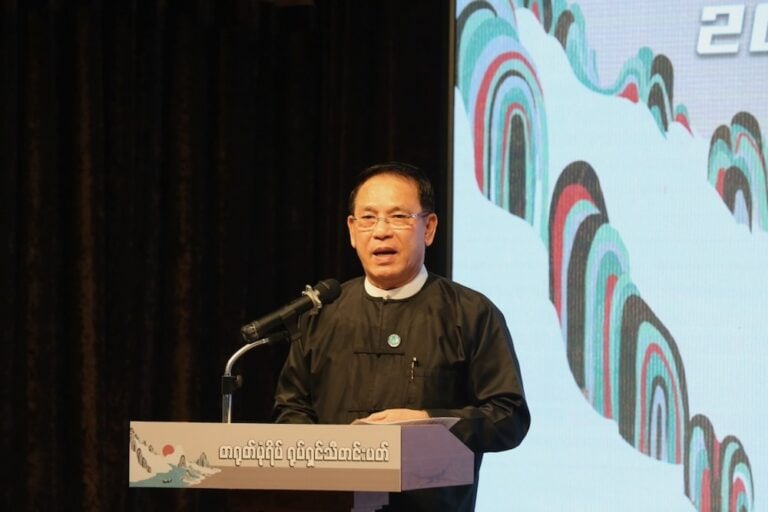(Mizzima/IFEX) – The following is a 24 April 2007 statement from Mizzima News, an interim member of IFEX: Two Burmese sentenced to prison for distributing wedding video of junta chief’s daughter; solo protester arrested On 25 April 2007, two Burmese citizens were sentenced to prison for distributing digital video discs of the wedding of the […]
(Mizzima/IFEX) – The following is a 24 April 2007 statement from Mizzima News, an interim member of IFEX:
Two Burmese sentenced to prison for distributing wedding video of junta chief’s daughter; solo protester arrested
On 25 April 2007, two Burmese citizens were sentenced to prison for distributing digital video discs of the wedding of the junta chief’s daughter, while an elderly man was arrested for staging a solo protest.
The Nyaungdone Township Court convicted Than Tun, 38, of “unauthorised circulation of materials aimed at instigating the public against the state” and “conspiracy to cause loss of respect for the head of state” and sentenced him to four years in prison. Fellow resident Tin Htay, 47, charged with “instigating the public against the state”, was also found guilty and sentenced to two years’ imprisonment.
The footage of the multi-million-dollar wedding of Thandar Shwe – the youngest daughter of Senior General Than Shwe – and Major Zaw Phyo Win was leaked to the press in 2006. The video captured Thandar Shwe in full bridal regalia, wearing a necklace of diamonds and precious gems, as did her mother Kyaing Kyaing, provoking public outrage at the extravagance of the ruling junta amid the poverty facing the rest of the country.
“They are gearing up to send the two to Maupin jail soon,” said Tun Tun, an observer at the trial. “Basically, the footage showed an extravagant wedding in a country suffering from hunger. It embarrassed Than Shwe, so he ordered the sentence.”
The authorities searched Than Tun’s residence in Nyaungdone in March and arrested him after finding the video footage and portraits of Burma’s late hero Aung San and his daughter, imprisoned democracy leader Aung San Suu Kyi. Both pictures were submitted as court “evidence”. The authorities found nothing in Tin Htay’s house, but charged him based on Than Tun’s confession – extracted following a severe police beating under interrogation – that the video discs came from Tin Htay.
The defence lawyer, Khin Maung Shein, told Mizzima that the charges are baseless and unsupported by hard evidence.
Elsewhere, in downtown Rangoon, an elderly solo protester was arrested for allegedly agitating against the government, according to an eyewitness.
Ohn Than, 61, a former political prisoner, was holding aloft placards near Theingyi market at 2:00 p.m. (local time) when he was taken in by plainclothes security officials.
He said he was demonstrating “to escape from the world’s poorest country, to demand the establishment of a people’s elected government, to get rid of dictators” and to invite the United Nations Commissioner for Human Rights to the country.
Public protest against the authorities has been strictly prohibited in military-ruled Burma since 1962 and several thousands have been jailed for exercising their basic right to demonstrate in order to express their concerns. Protest in Burma represents one of the only venues for the expression of dissent since citizens have no option of expressing themselves critically in the state-controlled media.
A supporter of Aung San Suu Kyi, Ohn Than was sentenced to two years in prison under Penal Code Section 505(B) after staging his first solo protest in front of the UN Development Programme office in Rangoon in 2004. Undeterred by the punishment, he joined about 20 protesters in Rangoon in February 2007 to call on the junta to address the social and economic woes facing the country. Sixteen of the demonstrators, including Ohn Than, were taken into custody, but later released (see IFEX alert of 13 March 2007).


